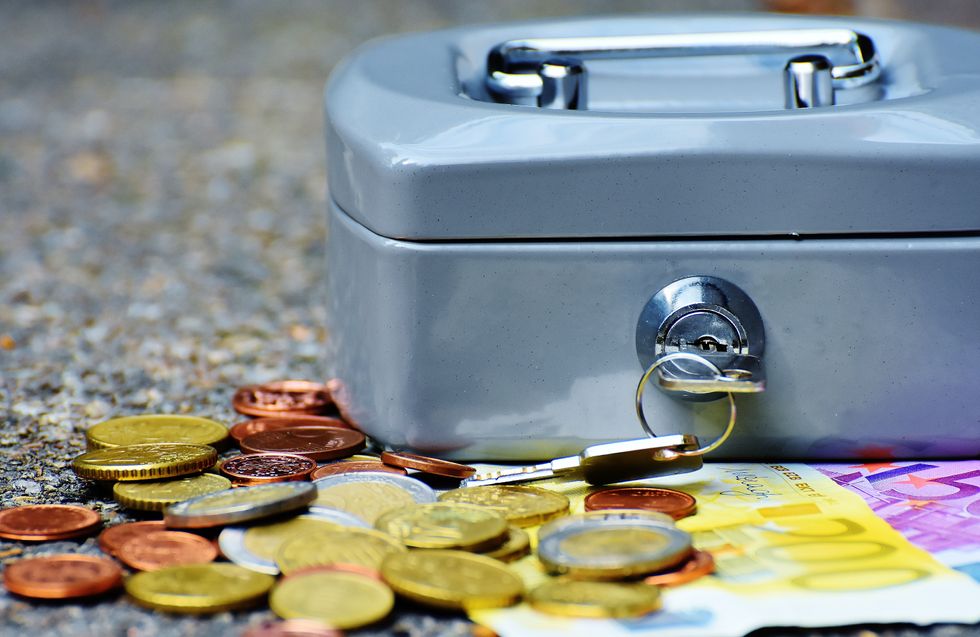Let's face it: College is EXPENSIVE! Not only do tuition, fees, and room and board add up big time, but being a college student also requires us to spend money on other things. A social life means going out for food or other activities, hobbies mean spending money on equipment of different kinds, and living out of the house means paying rent. No wonder we complain about empty pockets all the time.
Now imagine being an American college student AND living in a foreign country. That's right, study abroad only adds up the costs. Being away from home makes it tempting to spend money on the things that comfort us, but also requires students to be more independent with their money. However, there is a way to come out of study abroad actually SAVING money! Here are some tips on how to do this, if you want to get out of the "broke college student" rut.
1. Only use cash
Having a magic card that can immediately provide you with goods is dangerous. It's much easier to be careful with money if you can visibly see it disappearing the more you open your wallet. However, don't carry too much money at once. This can definitely lead to overspending.
2. Learn how to enjoy canned food
A weird one, I know. In Costa Rica (where I'm at) quick sources of protein are pretty hard to come by. Canned foods, such as chickpeas, black beans, tuna, etc., have become a really cheap way to add something extra to all the carbs I eat. Besides sources of protein, canned foods are CHEAP. I'm not saying to live off of the stuff, as some of it has so many preservatives it shouldn't even be considered food anymore, but if you need a quick snack I suggest good ole' cans. And if you need some flavor, sauce it up!
3. Don't get tempted by chains
With the exception of McDonalds (those reliable golden arches), American chains are typically WAY more expensive in foreign countries. No matter how much you may want that Starbucks latte, stick with local coffee shops. Choosing to try the places more native to your country of study also gives you the chance to try some different foods (although I would NOT be down for vegemite). Lastly, be forewarned of restaurants located in tourist spots, as they tend to be extremely overpriced in comparison to the spot a few blocks down.
4. Pre-make meals as much as possible
Through my study abroad program, I'm only provided breakfast and dinner. Everyday, lunch is on me. So I've learned that cooking some simple, portable meals before each day saves me a whopping amount of cash. Even those who may not be provided a kitchen can make sandwiches, salads, or microwaveable meals. Buying in bulk is always good! Major reminder here: don't buy food that easily goes bad unless you plan on using it the few days following your purchase.
5. Find where the locals shop
Depending on where you are in the world, this may be an outdoor market, small local chain, or large supermarket. Don't automatically assume that Walmart (or any variety of this) is the way to go. Local people know whats up, so ask around and figure out where you can get the best prices AND best food.
6. If you're legal, don't waste money at bars
Alright party people. All bars will probably serve overprices drinks, and will be tempted to charge more if you're clearly foreign. If you want to drink, buy alcohol from markets and SAFELY AND WITH MODERATION drink in this way before you go out on the town.
7. Research different forms of transportation before leaving the house
Sure, Uber is always a great option (if it's legal in your country). But busses or other forms of public transportation may be just as good AND hurt your wallet a lot less. This also applies to transportation around your Study Abroad country, as some super nice shuttles may be extremely overpriced. Try and find bus maps on the internet or ask locals how they get around. (Ex. I can get to either the Pacific or Caribbean ocean for no more than $5)
8. When traveling, choose hostels
I cannot stress how much I love hostels. If you're unfamiliar, hostels are privately owned places that provide the basics of hospitality: shared or private rooms, showers, kitchens or scheduled meals, common areas, WIFI, and personal assistance. Staying in hostels costs less than half compared to some hotels, and also saves you food money when provided a kitchen.
9. Be ok with simple, basic living
Although this is a good tip for college students in general, it's especially helpful when studying abroad. You have the ability to let go of your typical US habits and start with a clean slate, so if you can live without "fancy stuff", do it. Don't buy expensive toiletries, see if you can survive only on WIFI instead of international roaming, and adapt yourself to the lifestyles of a semi-nomad. All I'm saying is do your best to leave home expecting to rough it a bit.
10. Choose a cheap country!
I know, I know! I'm narrowing down your study abroad experience already. Just hear me out. Many cities are extremely expensive, even for the people that already live there. Make sure you don't overlook some of the cheaper countries, although they may not be as posh as London or Paris. Most study abroad programs already make traveling an easy expense for college students by working with host families, giving students many financial options, and establishing relationships with foreign universities. However, do you really want to be spending $10 on a muffin everyday?



























